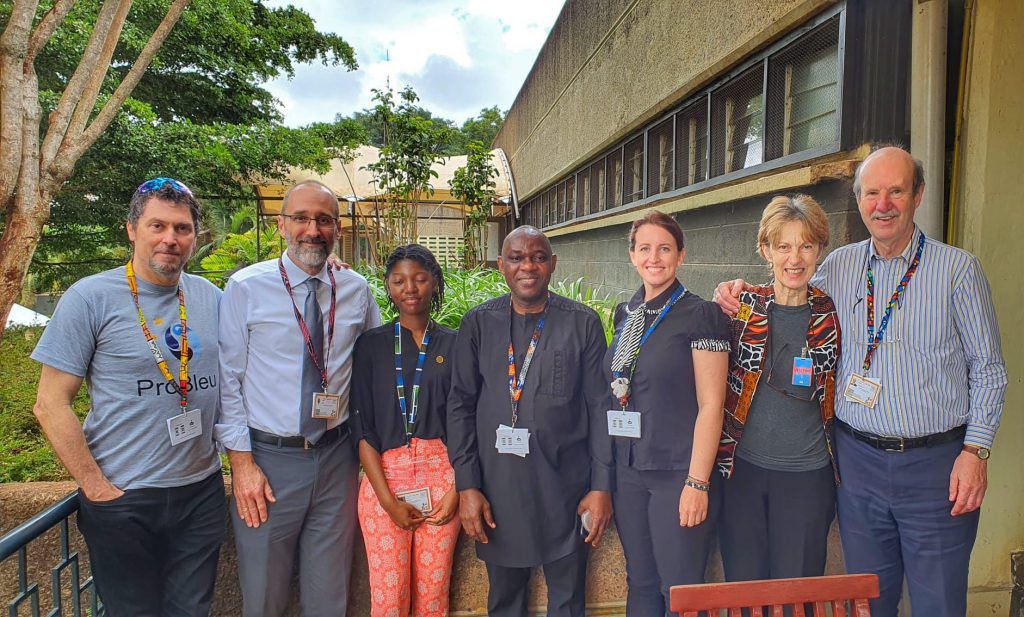As the world’s top decision-making body on the environment, the United Nations Environment Assembly (UNEA) aims to restore harmony between humanity and nature, improving the lives of the world’s most vulnerable people. UNEA-6, the 6th session of UNEA, focused on tackling the triple planetary crisis of climate change, nature and biodiversity loss, and pollution and waste through multilateralism, strong science, and engagement with society. It was held at the UNEP headquarters in Nairobi, Kenya from 26 February to 1 March 2024. Dr Bridie Schultz, who recently joined the ACSA Management Committee, attended UNEA on behalf of ACSA. She did a stellar job advocating for citizen science inclusion in a variety of UN Environment Programme (UNEP) endeavours as part of a global citizen science delegation. The following was written for the UNEA Monitor – a daily newsletter published during the assembly.

Left to right, Luigi Ceccaroni (European Citizen Science Association), Austin Mast (Citizen Science Global Partnership), Audrey Luvuno (CitSci Africa), Peter Elias (University of Lagos), Bridie Schultz (ACSA), Jacquie McGlade (Strathmore University), Martin Brocklehurst (CSGP)
Citizen Science – A Key Contribution to Multilateral Environmental Agreements (MEAs)
A high-level panel, which included a Keynote Address by former UNEP Chief Scientist Professor Jacqueline McGlade, laid out the principles and actions that funders, organisations and citizen scientists need to adopt to ensure citizen science is a core element of Multi-lateral Agreements at a Green Room Event on Friday morning 28th February.
With key interventions from Astrid Schomaker: Green Diplomacy & Multilateralism, DG Environment, and Dr Mohamed Adbel Raouf: Science and Technology UN Major Group; Gulf Research Centre, the 150+ delegates attending the meeting were left in no doubt about the value of the citizen scientist community concentrating on supporting delivery of the MEAs. Astrid stressed that citizen science is now expanding well beyond its traditional strength in biodiversity monitoring. Mohamed that it is strongly supported by the Science & Technology Major UN Group.
Practical examples of the sheer scale of current citizen science programmes were provided by Professor Maina Muniafu: Citizen Science Association Africa; Citizen Science Global Partnership, Professor Peter Elias: Citizen Science Association Africa; University of Lagos, and Professor Austin Mast: Association for Advancing Participatory Science; Florida State University. With citizen science data now exceeding data from traditional sources on biodiversity monitoring it is clear citizen science has the potential to be a key part of MEAs tackling Nature Based Solutions.
Dr Bridie Schultz Australian Citizen Science Association; Sativus Pty Ltd, closed the panel session with examples from Australia that found great empathy with the audience that citizen science is for everyone in society, that it can be scaled and that the proposed Charter on Citizen Science and the MEAs offered a way forward.
Martin Brocklehurst: Chair of the Citizen Science Global Partnership (CSGP); and Board Member of the European Citizen Science Association then presented the draft Charter for Citizen Science and the MEAs. He made the point that citizen science is now tackling climate change, air, and water pollution and gave an example of an EU project AURORA – Tackling Climate Change. Martin invited the audience to support and comment on the Charter as the CSGP seeks support for its adoption by the UNEA Secretariat and the global citizen science community.
